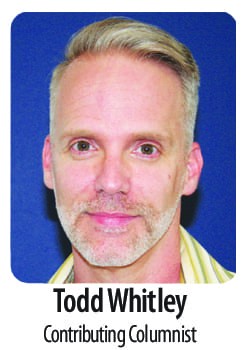 Recently the world saw a brave and compassionate local elected official take a stand for refugee children. And in a few ugly photo-ops, we saw groups of white Americans with ugly signs and ugly words — “Return to Sender” being among the most egregious — take a stand against the same refugee children.
Recently the world saw a brave and compassionate local elected official take a stand for refugee children. And in a few ugly photo-ops, we saw groups of white Americans with ugly signs and ugly words — “Return to Sender” being among the most egregious — take a stand against the same refugee children.
A person’s actions will tell you everything you need to know. Or, as a bestie puts it: “When someone shows you who they are, believe it.”
But unlike cities like Marietta, Calif., which blocked buses of children or hateful Collin County officials who just last week passed a ban on “illegal minors,” it’s nice to live in a city whose compassion outshone hate.
In my last column, I suggested that gays and lesbians as a group aren’t really all that interested in any causes outside those that affect them directly. A handful of folks took me to task for generalizing, pointing out the good works they themselves are doing for other causes.
Yes, there are many people doing many good things. But I am still unaware of any major, non-gay-oriented group that lists the LGBT community as its staunch ally.
And that includes immigrants.
I have two close friends who live here in Dallas who have a bi-national relationship. Until portions of the Defense of Marriage Act were overturned by the Supreme Court last year, these men were considering leaving the U.S. altogether because the time on the visa was running out. Unlike heterosexuals couples, the legal institution of marriage was unavailable to them as an option. About the only LGBT people visibly involved in this component of the fight for immigration reform was this couple’s circle of friends.
And yet marriage equity is only one facet of the complex immigration crisis.
What about the Dreamers — the estimated 2 million undocumented young people of all races who have been raised here in this country, who call America home, who have no path to citizenship? What about the families broken apart due to deportation? What about asylum for children who will likely be killed unless they leave their own countries or if they are sent back to their country of origin? What about gays and lesbians being persecuted in other parts of the world?
Where does the gay community at-large — locally and nationally — stand on the issue of immigration reform? Do we have a stand at all?
I’ve only heard a few gays make untoward comments about immigrants and the refugee children, but I know a ton who are indifferent. I wonder if that’s somehow worse.
As I’ve said before, ask anyone who’s heard me on my milk crate: As people who have experienced first-hand marginalization and second-class citizenship, gays and lesbians should be among the first to come to the aid of anyone experiencing marginalization.
To reach the point I am at today, I myself have had to first overcome my own indifference and then undergo a lot of education — from religious deprogramming to a comprehensive analysis of my world and the people I interact with. It has not been easy.
I’ve struggled with concepts of law versus feasibility, compassion versus reality, religion versus morality. I’ve grieved — and blown a few gaskets over — self-proclaiming Christian people cherry-picking scripture to somehow justify their un-Christlike stances.
I have tried to expand my experiences, to look into the faces of the undocumented, and have taken acquaintances and strangers alike to task for their views.
In the process, among a few looks of gratitude, I could see near-incredulity — even suspicion — in the eyes of some of the folks at the LULAC meeting I attended last week. It was as if they were saying: Why is this white man here talking to us about immigration reform? What is he really up to?
And I have experienced the backlash of disagreement.
You know, we all kinda laughed at the premise of the mostly critically panned 2004 film Spanglish. But the reality is that undocumented American workers not only contribute to our economy, they provide a host of services we born-here Americans don’t want to do without — and also don’t want to do ourselves.
Many of the undocumented are the people who serve us our chips and salsa. Who do our mani-pedis. Who provide landscaping services, clean our homes and offices, drive our taxis, build our highrises. Others work in the shadows in more highly skilled positions, teach in our universities and perform valuable research.
The undocumented are consumers and taxpayers. And what would we lose culturally if they were no longer part of our country?
Define American founder and undocumented gay American Jose Antonio Vargas, speaking at Cathedral of Hope last weekend, asked us to consider, “What would happen to the United States if we all just left? I don’t know any immigrants who have come to America not to work.”
So sure, send them all home. And watch our infrastructure crumble and our economy crater.
Whether they’re straight or gay, these folks are our natural allies. Rather, we naturally should be their allies.
I am an individual who enjoys a large amount of privilege: I am white. I am a man. I am an American citizen. And I am gay, which automatically makes me more fabulous than my heterosexual counterparts. I, for one, think it’s time I use my privilege to promote the causes of others.
What if the LGBT community as a whole did the same? Can you imagine the change we could effect? And the humanitarian clout our cause would garner in the process?
This article appeared in the Dallas Voice print edition August 8, 2014.

